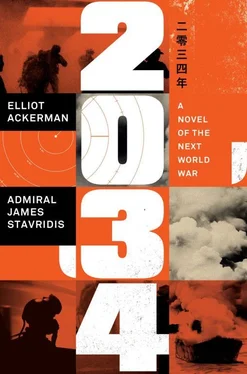General Bagheri informed Farshad that he had no choice but to follow orders. He was compelled to reinforce the islands. But his reinforcement would be a single person: Farshad. When he departed General Bagheri’s office, it was to a small dhow that was waiting to take him to his new, desolate posting. Since arriving on the islands, Farshad hadn’t allowed himself to wonder how much longer he would remain there. If the Russian invasion—those Spetsnaz parachutists supported by their navy—never arrived, how long would Bagheri keep him postured to repel an assault? A week? A month? A year? The rest of his pitiful life? Farshad had come to realize that by delivering his message directly to the high command he had become the architect of his own exile.
The few hundred conscripts who manned these defenses had been enduring a similar exile, some of them for years. As Farshad mingled among them, he learned that most had a history of disciplinary infractions. These islands had become a dumping ground for hard cases. The supply depots sent them no fresh food, only packaged rations. They showered once a week. The tents they slept in were often blown away by the unpredictable winds that thrashed through the strait.
Unlike General Bagheri, the men on the island had accepted the idea of a Russian invasion, even if such an occurrence seemed like an improbability. What were the odds, one in ten? Even less? But what else did they have to do but prepare, and how long would the odds have to be on their lives for them to take no precautions whatsoever? And so they filled sandbags, they calibrated the ranges on their antiaircraft guns in precise intervals of one hundred feet, and they endured incessant inspections by Farshad while they waited for the invasion.
At night under his tent, with no special accommodations afforded him, Farshad began to think of home. He wanted to return. The desire entered his dreams. It wasn’t the comfort of his bed that he envisioned, or the warmth of his house, or a good meal. It was his family’s land, specifically his garden. With the fierce winds whipping against his tent, surrounded by the sleeping heaps of rejected soldiers, he concluded that he’d seen enough. If he ever got off this rocky island, he swore to himself that he would finally go home. And he wouldn’t again make the mistake of leaving.
These dreams recurred fitfully each night, all except for this one. It was the only night that he slept the whole way through. It was also the only night that the wind shifted its course, dying down to a gentle breeze. This night he dreamed most intensely of all.
He is back in his garden, performing the routine he’d fallen into after his expulsion from the Revolutionary Guards. He writes his memoirs in the morning. He takes his walk at around noon, lunching beneath the elm tree on the far end of his property. When he finishes his meal, he leaves the scraps out for the pair of squirrels to eat. And he waits. He is conscious that he is dreaming, and he hopes that both squirrels might again appear. He thinks that this time he might restrain himself and not kill the squirrel if it bit him. Farshad waits a long while in this dream. The longer he waits, the more the landscape changes. The trees dry up, their brittle leaves falling around him. The thirsty grass turns to stubble and then to bleached rock. The rock is the same as the island’s.
The next morning, right at dawn, the wind returned. He woke up to its howl. It stretched the fabric of his tent before yanking up the stakes and sending that same tent tumbling toward the sea. Farshad lay in the dawn with nothing between him and the sky except for the wind.
“Look!” one of the conscripts cried out.
He pointed to the east, in the direction of the rising sun. Farshad squinted, making a visor of his hand.
Dozens and dozens of them.
More than he could have imagined.
Arranged like a vast migration of birds.
“They are here!” he shouted to his garrison, but the wind drowned out his voice.

06:32 July 30, 2034 (GMT+8)
South China Sea
Weather had been erratic, thunderstorms appearing violently and then vanishing. Wild fluctuations in temperature. Golf ball–sized hailstones fell on the deck of the Enterprise one morning. That same evening, the temperature peaked at ninety-two degrees. The onboard meteorologist surmised that this erratic weather was the result of the atmospheric fallout from Galveston and San Diego. They had struggled to find a launch window for Wedge and the nine Death Rattlers. Each time they’d be given the all-clear and migrate to their ready room for a final mission brief, a fresh weather system would appear. Complicating matters further was the fact that they didn’t need passable weather but perfect weather. The Hornets that Wedge and his crews would be flying didn’t have GPS-guided bombs. Without that technology they’d have to drop their ordnance in the old way, which meant they needed clear skies over the three target cities.
After the fourth or fifth aborted launch attempt (Wedge had lost count), he found himself alone in his stateroom, sitting at his desk, trying to pass the time. Two levels above him, he could hear the ground crews working. Each iteration of stand-up-then-stand-down cost them several hours. They couldn’t allow nine fully armed Hornets (particularly given the nature of their armament) to idle on a flight deck that was pitching through rough weather. Wedge took out his flight plan, reviewing it yet again:
*Nine aircraft launch, divided between three flights (Blue, Gold, Red)
*Arrive at release point (28°22’41”N 124°58’13”E)
*Set course and speed to target: Xiamen (Blue), Fuzhou (Gold), Shanghai (Red)
*For redundancy each aircraft armed with nuclear payload
*Only one aircraft per flight drops payload
*Return
He knew that last bullet point—despite being the shortest—was the one with the least probability of success. He could feel it in his gut. But Wedge didn’t do suicide missions; that’s what he’d told Admiral Hunt and he’d meant it. Instead of fixating on the slim probabilities of his return, he diverted his attention elsewhere….
He began a letter.
It wasn’t an if-you-are-reading-this-then-I-am-gone death letter. He’d always held those in low esteem, thinking of them as little better than suicide notes. Instead, he thought of it as a historical document. He wanted to capture his thoughts on the eve of victory. He addressed the letter to his father.
Wedge found himself writing in a sort of stream of consciousness, freed from the way he normally wrote, which was the composition of lists like the flight plan he’d just reviewed. It felt good to write in this way, a release. Although it was only him, alone in his stateroom, he wanted to bring all the world into this moment. The more he wrote, the more aware he became of his place in the universe. It was as though he could see his words being read by future generations of American schoolchildren before he’d even composed them. He could envision a child standing in front of the class, reciting portions of this note from memory in much the same way Wedge himself had recited the Gettysburg Address. This wasn’t his ego at work; he knew that he possessed no remarkable gifts of expression—a C-minus in freshman English could attest to that. Rather, Wedge knew it was the moment itself that was remarkable, a moment in which everything was on the line. Then he thought, Christ, Wedge, get a grip.
Except for a single page, he crumpled up the many sheets of paper and pitched them in his trash can. The remaining page sat on the desk in front of him. He didn’t read it over.
Читать дальше













